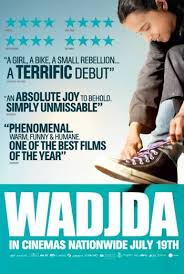
WAJDJA
Saudi Arabia, 2013, 98 minutes, Colour.
Waad Mohammad, Reem Abdullah.
Directed by Haifaa Al Mansour.
A very interesting film, a portrait of a young girl, precociously forward, with ambitions – which, however, are not considered appropriate for a girl growing up in Saudi Arabia. She is the Wajdja of the title.
Saudi Arabia does not have a film industry and this is one of its first films, and the first to be directed by a woman, who did her studies in cinema at Sydney University. She had some difficulties in making the film, especially in associating with men in the workplace, she doing her direction from inside a van, watching a monitor, with walkie-talking communications with her cast. That she has made such a well-crafted as well as interesting film is to her great credit.
This a significant film about life in Saudi Arabia. It is particularly significant as regards the place of women in society, the restrictions, the prohibitions for activities as well as for communication, especially with men.
Wajdja lives at home with her mother – and inside the house, there is a certain freedom, especially in dress, make up, conversation. But this changes when the women go outside, the importance of the woman covering herself, being cautious in the presence of men, and not being allowed to do such ordinary things as drive. Wajdja has a great ambition at this stage of her life to have a bike and to ride it and to race her friend down the street. But, if the women come into the eye line of men working outside the house, they have to hide…
Wajdja is at school, something of a mischief maker, but decides to learn more about the Koran and enter a competition about references and texts from the sacred book. There is prize money which she intends to use to buy the bike – but, when she wins, the teacher thinks it more appropriate for her to give the money as a donation for Palestinians.
In the meantime, her father who works away from home, is disappointed that his wife has not given him a son and is unable to do so. He is in the process of marrying again and moving out of the house, despite his declarations of love for his wife and daughter. Again, women as victims of marriage traditions and expectations of others to have sons.
The film was very cheerful for most of the time despite the sad and sometimes grim undertones. Wajdja herself may be engaged in the future in transitions in the status of women in her country. In the meantime, she offers an entertainment, the story of a young girl, and, especially for Western eyes, quite a different cultural experience.
1. The impact of the? From Saudi Arabia? The feature film from a country without an industry? The woman director – for the first time? Oscar-nomination from Saudi Arabia?
2. Saudi Arabia and women, their being silent, more freedom in the home? The contrast with men, out and around? The women having to cover themselves when going out? Possibilities for change or not?
3. The difficulties for the from-, the director not being seen with men, filming in the van, looking at the action on a monitor, walkie-talkie connections with the performers?
4. Long traditions in Saudi Arabia, the rules, the law? In the 20th century? Possible developments in the 21st century? New generations, social media, connections with the Western world?
5. The story of the status of women via the portrait of a little girl? The actress and her screen on screen presence? The initial singing and movement with the group, her being highlighted, with the other girls school, classes, the teachers, her being cheeky, the touch of independence? Her absent father but his phone calls, the visits, his love for her, going out, the shops, his leaving? Her mother, the difficult birth, unable to have more children? The bond with her mother? Things normal at home? The contrast with going out? Her friendship with the boy, riding his bike, the hopes, the shop with the bike, his helping her selling things to raise cash for the bike? Her writing, falling down, daring him for a race? Her friends and their company, the visits and sharing?
6. School, the lessons, going to the course on the Koran, the teacher and her severity, the silence of women? Building up to the test? The quiz show, her doing well, winning the prize, getting the money, and the teacher saying it would be for Palestinians and certainly not for the bike?
7. Her mother, stylish at home, covering to go to work, her relationship with her husband, fears, sadness, his message of love, but his leaving her?
8. Father, his work, the visits, his wanting a son, searching for another wife, the ceremonies in celebrations, visiting home, taking his daughter out, leaving the message of love to his wife while abandoning her?
9. The teachers, their attitudes?
10. The screenplay and its finding opportunities to insert statements about men and women, showing sequences for the oppression of women, going out, covered, clashes with the driver, and the daughter challenging him to take her money her mother to work? Men seeing the women, the workers, the women having to hide? The effect on them?
11. The mother buying the bike, her daughter and her joy?
12. The film’s contribution to changing attitudes, traditions, social interaction? Interpretations of the Koran?